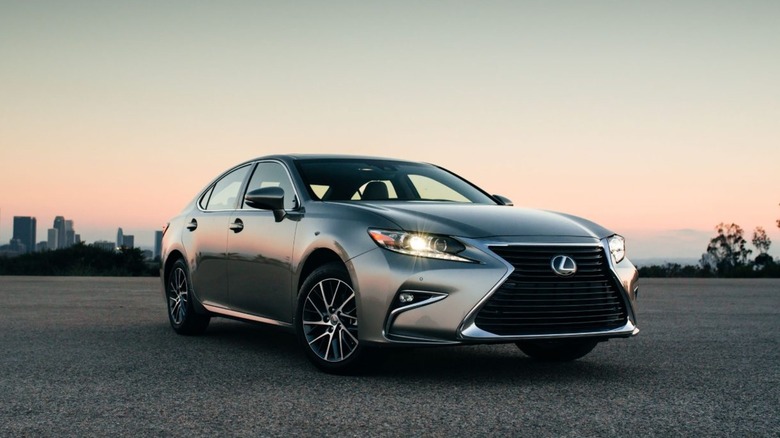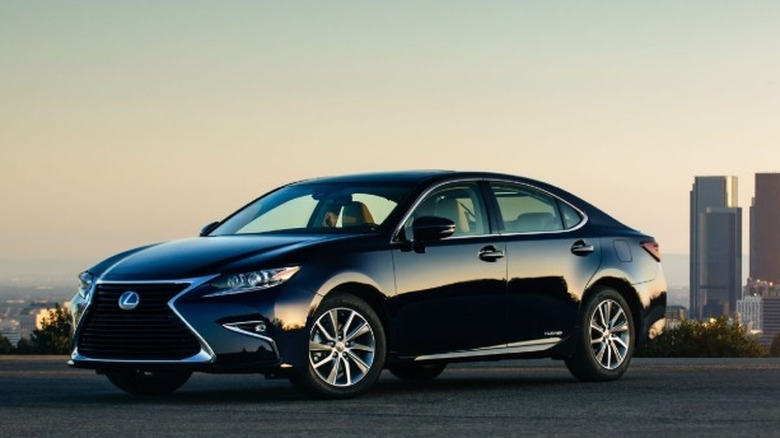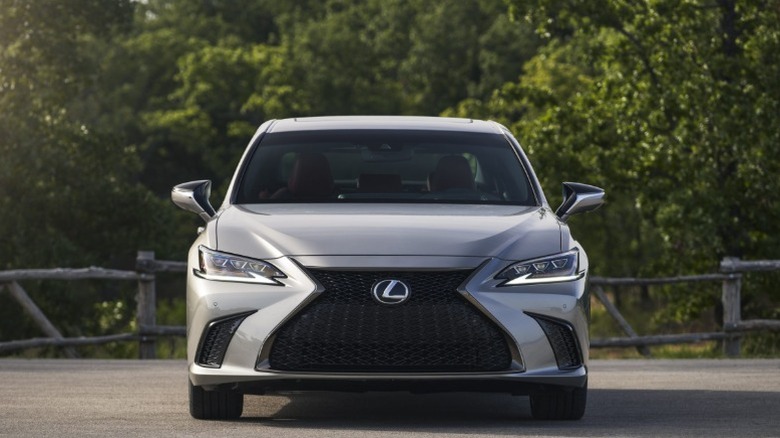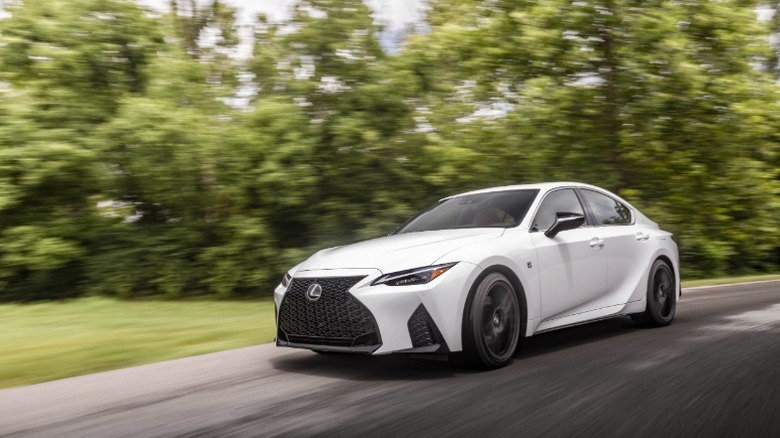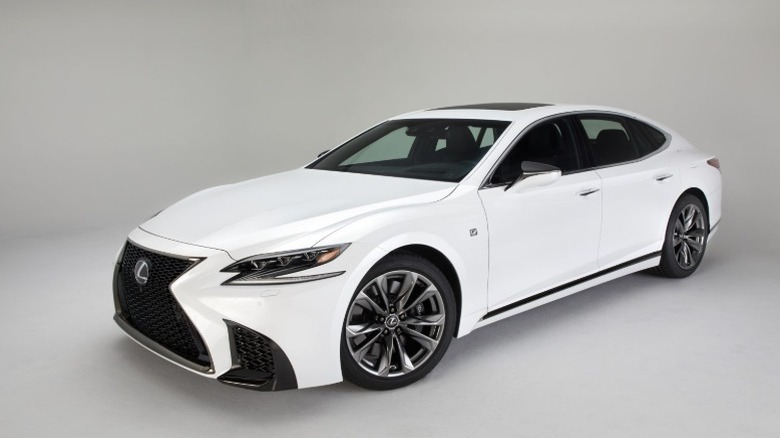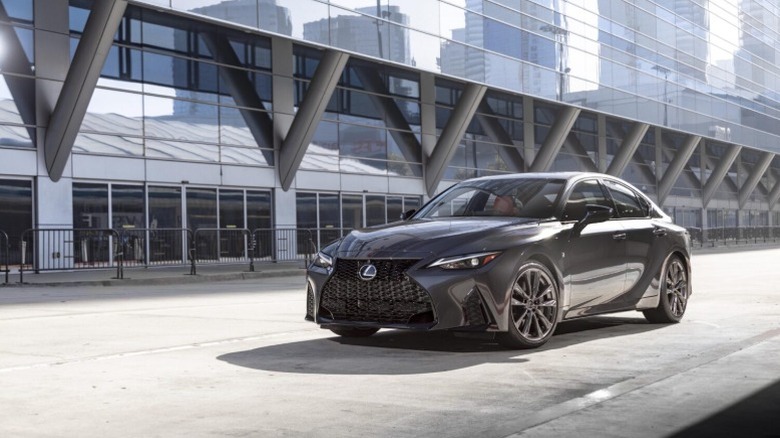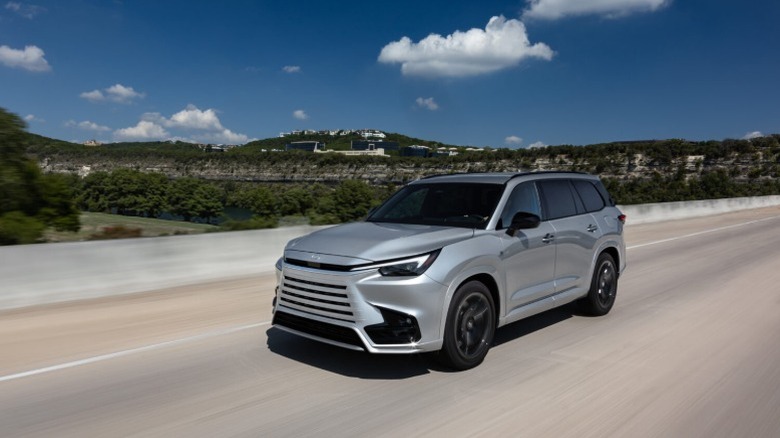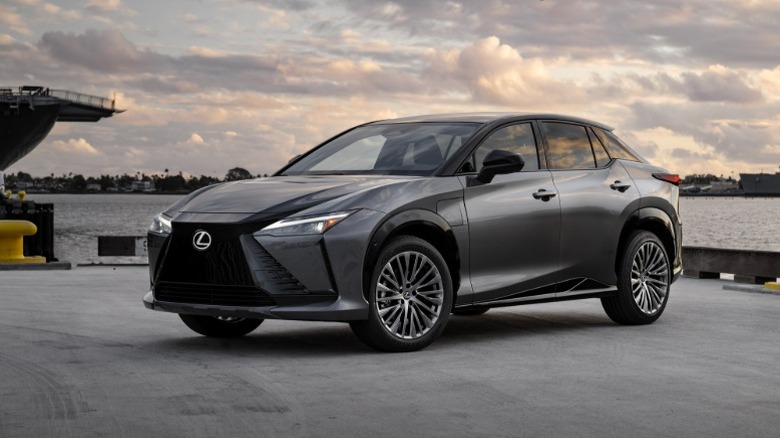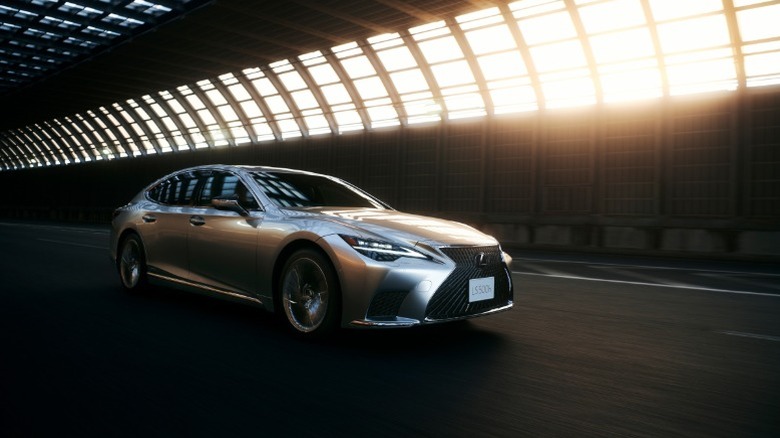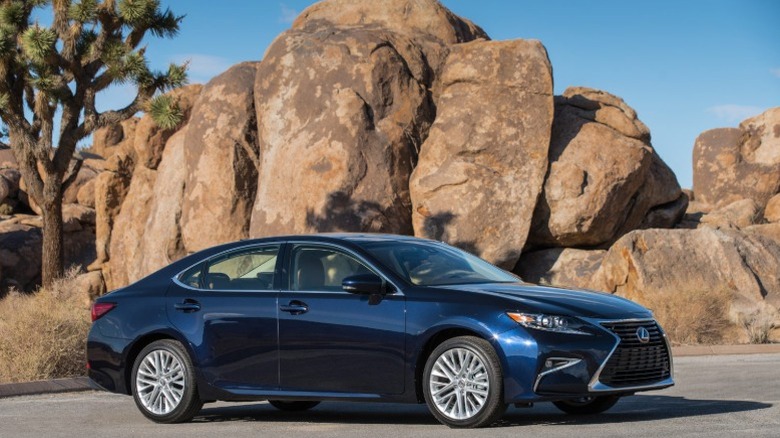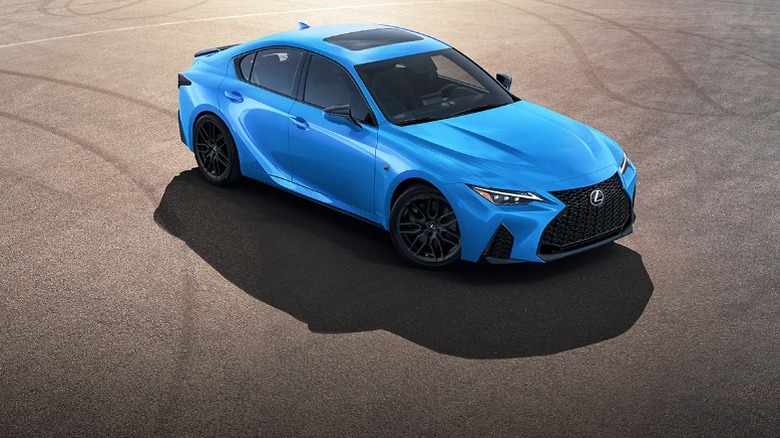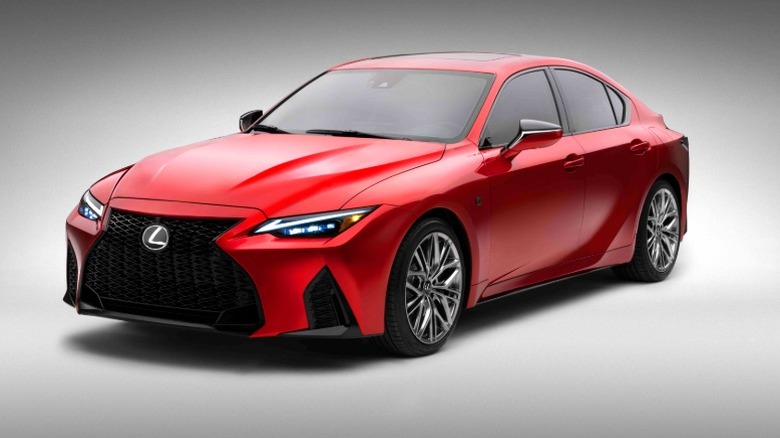10 Lexus Models With Terrible Resale Value
Japanese car manufacturer Lexus is one of the most popular automobile brands today, known especially for its commitment to luxury. Nevertheless, if you're looking to invest in this brand or any car brand, you should consider how well it retains its value. Many buyers don't give this much thought until it's time to sell, only to be disappointed when they realize their car isn't worth as much as they expected.
A number of factors influence resale value. While some are within your control, like ensuring regular maintenance, keeping vehicle records, and avoiding excessive mileage, sometimes it just boils down to the car model you're purchasing. Some brands manage to retain popular appeal among buyers of used vehicles due to various reasons, like demand and brand perception.
Even though luxury brands don't retain value as well as others due to their cost and maintenance, with Lexus, you generally don't have much to worry about. Its reputation for reliability, like that of its parent company, Toyota, allows it to retain value over time. However, not all models are as impressive as others, so we used data from iSeeCars and Car Edge to help you know which ones suffer the most loss in value. That said, here are 10 Lexus models with terrible resale value.
ES 300h
The Lexus ES 300h was introduced in 2013 as a hybrid variant of the Lexus ES. The vehicle serves as a budget-friendly option for buyers who want a luxury midsize sedan, competing with the likes of the Toyota Avalon Hybrid and the Honda Accord Hybrid.
While this hybrid car is on our list of Lexus models with the worst resale value, it's actually one of the most reliable luxury midsize vehicles you can get. This isn't surprising as Lexus tends to outperform its competitors. In fact, if you're looking for a used hybrid model, it's a solid choice, which is why the 2017 model made it to our list of the best used Lexus models to buy.
However, reliability doesn't always translate to excellent resale value — at least not for this vehicle. According to CarEdge, it loses about 52% of its value in five years. This means that if you purchased your vehicle for about $51,534, you'll sell it for about $24,736 in five years. iSeeCars projects less depreciation, estimating a 48.9% reduction in value within that time frame. While this may be a high figure for Lexus, it does perform well above average in the luxury hybrid midsize car category.
ES 250
The ES 250 was the very first Lexus ES, debuting in 1990 alongside the company's flagship model, the LS. Although not as popular, it shared similarities with the Toyota Camry, notably in terms of performance. The Lexus ES 250 does stand out among many competitors in its class, but it's not great in terms of resale value.
CarEdge says this model will retain more than half of its value in the first four years. In the fifth year, it'll depreciate by 52% and in the 7th year by 63.3%. If you plan to resell this car after a decade, it will have lost about 70.95% of its value. Now, if you compare this model with other luxury, midsize cars in terms of resale value, it's a pretty good option. However, when ranked against other Lexus models, it doesn't shine as bright as others like the LC 500, GS 300, and GS F. If you plan to sell your ES 250, letting it go in the first couple of years will give you the most value.
IS 350
Lexus has released two generations of the Lexus IS 350 so far, the first of which launched in 2006. The 350 sits comfortably between the IS 300 and the IS 500. As a midrange option, it's a good blend of performance and value. The 2024 model even made our list of the fastest Lexus vehicles ever made. And it's not just the acceleration we love. There's also the smooth and refined riding experience.
This compact luxury sedan comes with an athletic build and impressive modern features. It's another Lexus model known to be reliable but is not as well regarded for its resale value. According to Car Edge, the IS 350 has a 52% depreciation rate after five years, estimating that your car will sell for around $23,036 after half a decade of use. iSeeCars, however, estimates that the vehicle will have a value of $25,862 in five years, so the value of your IS 350 is likely to fall within that range. Bear in mind that factors like vehicle mileage and maintenance history play a significant role in deciding the value.
LS 500
The Lexus LS is the company's most luxurious model and also one of its most successful. But while there's a demand for this vehicle in the market, compared to other Lexus models, the LS 500, which debuted in 2018, has an unimpressive resale value.
CarEdge predicts that this model will depreciate by 52% after five years. This means it will sell for about $41,629, assuming it was newly purchased for $86,728. iSeeCars, on the other hand, estimates that it will lose about 50.2% of its value. Although this percentage is lower than average for large luxury cars, it's still significantly higher than the depreciation rate of the average sedan.
These figures aren't too surprising, given that despite the vehicle's popularity, it has its fair share of shortcomings. In our review of the 2024 model, we found the driving experience underwhelming, especially in Sport S and Sport S+ modes. The transmission is not only complex but also struggles with linear power delivery, unlike competitor sedans. In short, the LS 500 has, over the past few years, started to fall behind as a luxury flagship model.
IS 300
Before it hit the American market, the Lexus IS was actually known as the Toyota Altezza back in Japan. The IS, which stands for Intelligent Sport, launched officially in 2001 and has been through more than two decades of production.
As an entry-level offering, the IS 300 is the most affordable trim in the IS model range and offers a decent performance and driving experience. The difference between this vehicle and the IS 350 and IS 500 lies primarily in its engine and drivetrain. When it comes to resale value, however, the difference is less obvious. CarEdge estimates that it'll depreciate by 52% after five years.
Like the LS 500, recent models of this vehicle tend to come with an uninspiring interior that likely impacts its long-term appeal and gives rivals like the Genesis G70 an edge in the used vehicle market. However, iSeeCars estimates that your IS 300 would retain as much as 69.9% of its value after three years, which is better than most luxury compact cars.
TX 500h
It might come as a surprise that this model made it to the list since the TX was also featured in our list of Lexus models with great resale value. However, estimates for resale value are often inconsistent, and factors like the specific trim you're buying also play a significant role. Furthermore, Lexus retains value well overall, so even some of the so-called poor resale models still perform well compared to the competition.
According to CarEdge, the TX 500h will depreciate 42% after five years. On the other hand, iSeeCars estimates that the car's value will decline by 49% within the same time frame. Now, it's not as bad as some other models on this list, but it generally ranks pretty low when compared to Lexus models generally. However, bear in mind that not all model years will perform the same, and the estimate from iSeeCars applies particularly to the 2025 TX 500h.
Also relevant is the fact that the TX is still a new addition to Lexus' luxury SUV lineup. It was only introduced in 2023, and since reception over time can impact its resale value, these figures are not so predictable and can change with time.
RZ
Like the TX, there aren't many used RZ models on the market. The model debuted in 2023 and was introduced as Lexus' first pure battery EV (BEV) model available globally. This SUV has the worst resale value on this list, with a 55% depreciation rate after a period of 5 years. Estimates show that selling an RZ, even after four years, will result in a loss of more than half of its original value.
This high depreciation rate is attributed to a number of factors. Firstly, it's not a great choice for long-distance travel due to its limited range. It is estimated to travel between 196 and 266 miles per charge, a figure that doesn't match up to rivals like the Tesla Model Y, which offers up to 330 miles per charge. On top of that, the charging speed is slow, with a battery that can only handle up to 150kW, and the performance on the road is mediocre, leaving many of its buyers disappointed.
Overall, with options like the Toyota bZ4X and Subaru Solterra, which share the same platform as the RZ and offer more competitive price points, it's not surprising that this Lexus model is not in high demand in the used car market.
LS 500h
The Lexus LS 500h is the hybrid version of Lexus' flagship luxury sedan. Like the LS 500, this model is among the lowest resale values in the company's offerings. In fact, according to iSeeCars, it loses more value over time than the LS 500. After five years, the LS 500h only retains about 47.6% of its residual value, making it one of the Lexus models with the highest depreciation rate.
The figures on Car Edge are not too far off. It estimates a 48% residual value in five years, with a further depletion to a 33.95% value in eight years. In 10 years, the LS 500h is expected to resell for about $33,861, which constitutes 29% of its original cost.
Now, this does not suggest that the LS 500h is a terrible car. The luxury sedan has sufficient space and comfort, an excellent riding experience, and a very stylish design. However, the vehicle does not match up to other luxury sedans in power and performance, which is likely a key reason it isn't as appealing to buyers as other Lexus models.
ES 350
The ES 350 has been around for quite a while. It joined the ES lineup in 2007 with a V6 engine, larger frame, and bolder design. As of writing, there are three generations of this model, and it has seen a bunch of changes to its interior and exterior components. Although it has its perks, high resale value is not among them.
Like many cars on this list, the ES350 loses about 52% of its value after five years, according to CarEdge, which is much lower than many other Lexus models. However, the reliability of this vehicle is harder to predict than it might seem.
According to iSeeCars, if you sell this vehicle after five years, you still get 56.5% of its original value. It is also ranked as one of the top luxury midsize cars in terms of resale value. Bear in mind, however, that it doesn't rank as high among other Lexus models. So, while it's a good option compared to rivals in its segment, it's not that great compared to other Lexus offerings.
IS 500
The IS 300 and IS 350 have featured on this list, so you might have seen this one coming. The IS 500 is also one of the most underwhelming Lexus models when it comes to resale value. Topping the trim offering on the IS is this performance-oriented sedan that is known for its powerful V8 engine.
Generally, an IS 500 is worth the investment, even if it goes for a higher price point than the other trims. It embodies the reliability of a Lexus, and it pretty much has all you'd expect from a luxury Lexus four-wheeler, except, of course, for some of the dated tech on recent models.
Interestingly, the depreciation rate of this model is lower than that of IS 300 and IS 350. Car Edge estimates that the value will plummet by 48% after five years, whereas the others depreciate by up to 52%. When you hit the 10-year mark, the gap is less noticeable, as the IS 500 loses about 29.9% of its value, while the lower trims lose 29.05%. According to iSeeCars, the depreciation is lower and placed at 40.3% after five years.
Methodology
This list was compiled using information from platforms like Car Edge and iSeeCars, which combine various kinds of data to estimate the depreciation and resale value of car models. iSeeCars calculates the difference between the car's price when new and its subsequent price as a used car on the market. It takes into account things like the automaker and vehicle segment to add better context and insight and compare to other vehicles in the segment.
It's important to note that these are estimates, and various factors would determine the value of a used car, such as its maintenance, mileage, and overall condition. On Car Edge, the estimates are made for vehicles in good condition, using an average of 13,500 miles per year. In reality, the value of your car may be more or less. Regardless, it serves as a really helpful guide to know what various car models would be worth in a few years.
